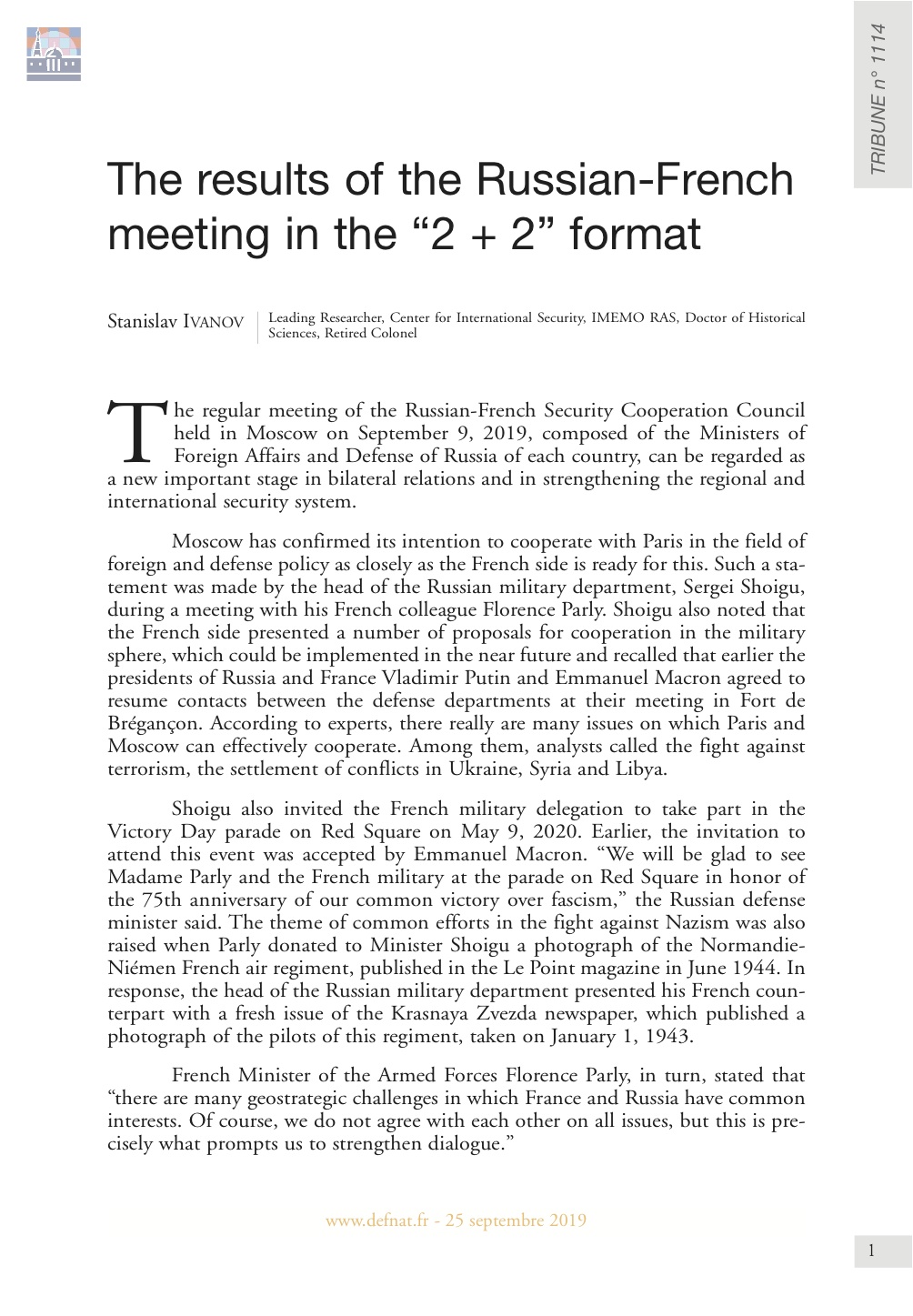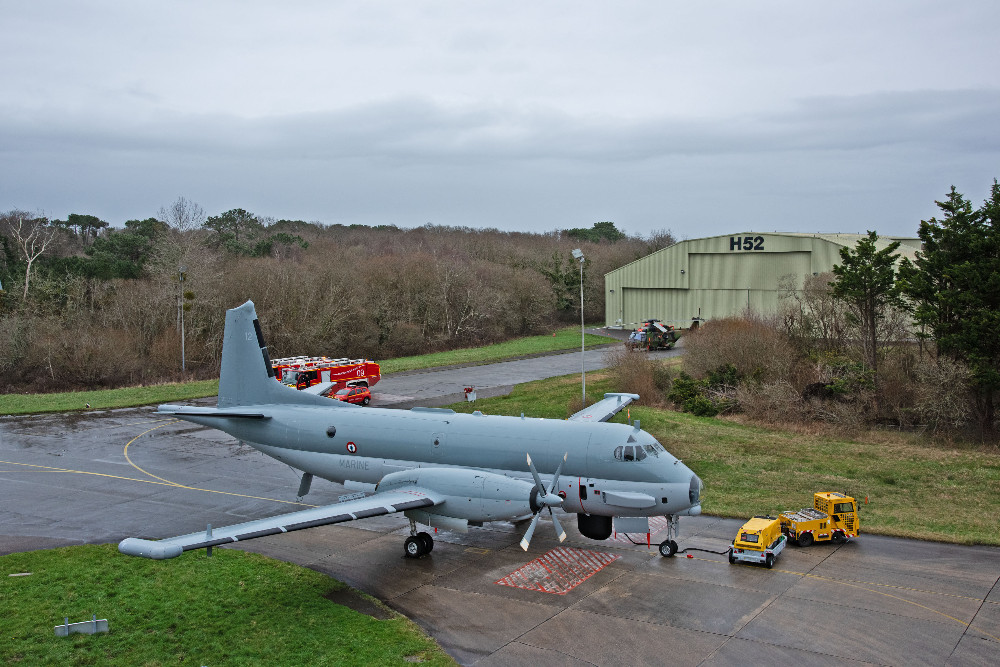C'est une première depuis 2012. La réunion à Moscou, le 9 septembre 2019, du 12e Conseil de coopération de sécurité franco-russe, en présence des ministres de la Défense et des Affaires étrangères des deux pays, peut être vue comme une nouvelle étape importante dans les relations entre Moscou et Paris, ainsi que pour le renforcement du système de sécurité régional et international.
The results of the Russian-French meeting in the « 2 + 2 » format (T 1114)
The results of the Russian-French meeting in the “2 + 2” format (T 1114)
It is a first since 2012. The meeting in Moscow, on September 9th, 2019, of the 12th counsel of coopération of Franco-Russian security, in the presence of both countries' ministries of defense and international relations, can be seen as an important new step in the relations between Moscow and Paris, as well as one that strengthens the international and regional security system.
Moscow has confirmed its intention to cooperate with Paris in the field of foreign and defense policy as closely as the French side is ready for this. Such a statement was made by the head of the Russian military department, Sergei Shoigu, during a meeting with his French colleague Florence Parly. Shoigu also noted that the French side presented a number of proposals for cooperation in the military sphere, which could be implemented in the near future and recalled that earlier the presidents of Russia and France Vladimir Putin and Emmanuel Macron agreed to resume contacts between the defense departments at their meeting in Fort de Brégançon. According to experts, there really are many issues on which Paris and Moscow can effectively cooperate. Among them, analysts called the fight against terrorism, the settlement of conflicts in Ukraine, Syria and Libya.
Shoigu also invited the French military delegation to take part in the Victory Day parade on Red Square on May 9, 2020. Earlier, the invitation to attend this event was accepted by Emmanuel Macron. “We will be glad to see Madame Parly and the French military at the parade on Red Square in honor of the 75th anniversary of our common victory over fascism,” the Russian defense minister said. The theme of common efforts in the fight against Nazism was also raised when Parly donated to Minister Shoigu a photograph of the Normandie-Niémen French air regiment, published in the Le Point magazine in June 1944. In response, the head of the Russian military department presented his French counterpart with a fresh issue of the Krasnaya Zvezda newspaper, which published a photograph of the pilots of this regiment, taken on January 1, 1943.
French Minister of the Armed Forces Florence Parly, in turn, stated that “there are many geostrategic challenges in which France and Russia have common interests. Of course, we do not agree with each other on all issues, but this is precisely what prompts us to strengthen dialogue.”
In parallel with the meetings of the heads of the foreign affairs and defense departments of Russia and France, negotiations took place between the Secretary of the Russian Security Council Nikolai Patrushev and the Secretary General for National Defence and Security of France, Claire Landais.
One of the central topics of negotiations in Moscow was the situation around Iran. Moscow and Paris have confirmed that they are committed to maintaining the Joint Comprehensive Plan of Action for the Iranian Nuclear Program (JCPOA). Foreign Minister of Russia Sergey Lavrov noted: “There is no reasonable alternative to this plan.” French colleagues agreed with him. He also praised the efforts of French President Mr. Macron to save the nuclear deal.
The ministers discussed the situation in Syria and Northern Africa. According to Shoigu, coordination between the two countries in the fight against terrorism and extremism in the territory of the Syrian Republic and in other countries will continue. At the same time, the problems of the return of refugees and the establishment of a political process in Syria were raised. It should not be ruled out that, as a result of military contacts between Russia and France, a decision may be made to conduct joint peacekeeping operations in the Middle East and Africa.
The negotiators paid much attention to the security situation in Europe after Washington withdrew from the Intermediate-Range Nuclear Forces Treaty (INF), on medium and short-range missiles. The position of the Russian leadership was confirmed: not to deploy missiles of this type in those regions where similar systems of American production will not appear.
Among the topics raised at the meeting was the conflict in Ukraine. According to Minister of Europe and Foreign Affairs Jean-Yves Le Drian, Paris hopes that the leaders of the “Norman Four” (Ukraine, Germany, France, Russia) will meet in the coming days. He noted that in the resolution of the conflict in the south-east of Ukraine, significant progress has recently been made, one example of which is the exchange of prisoners.
This round of Russian-French negotiations should not be seen as a challenge to the foreign policy of the U.S. administration or NATO leadership. It is possible that Macron and Trump on the eve agreed on common areas for continuing dialogue with Russia. Both Washington and Paris have an understanding that without the participation of Moscow there can be no lasting system of global international security and strategic stability. It is no coincidence that Florence Parly met with U.S. Secretary of Defense Mark Esper before negotiations with Shoigu. ♦







_astronaut_Sophie_Adenot_(jsc2025e058846_alt).jpg)

